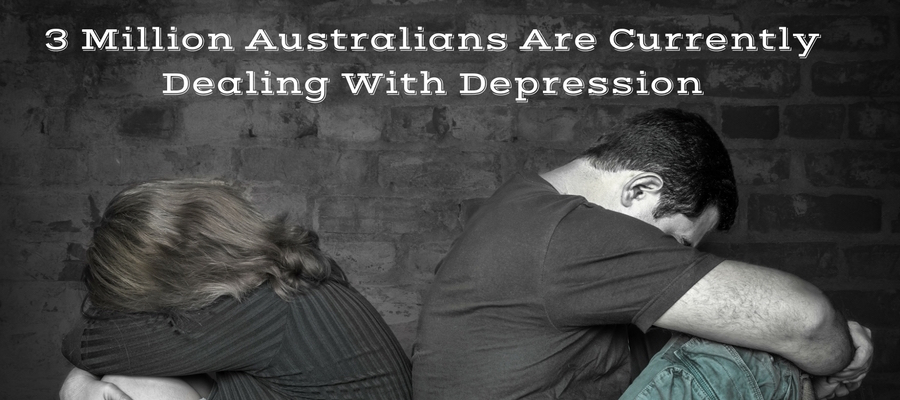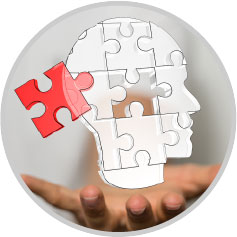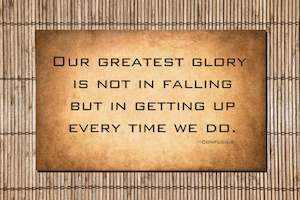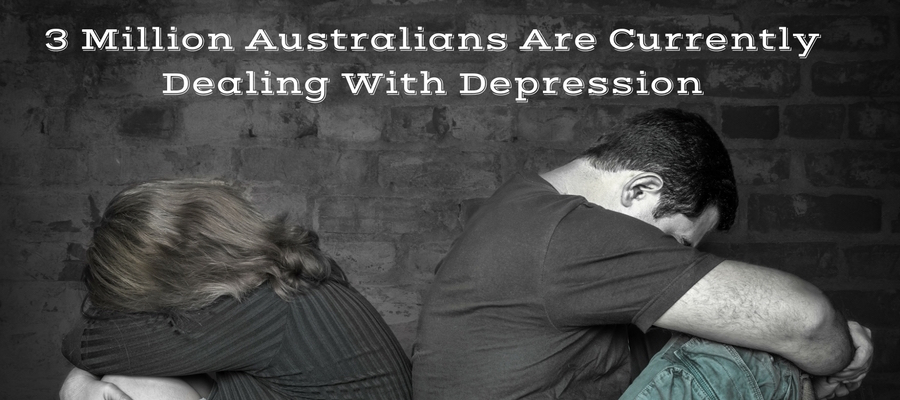
Last year I attended the “International Congress of Natural Medicine” with global thought leaders on the topic of depression, mental health, dementia and ageing.
3 MILLION AUSTRALIANS ARE DEALING WITH ANXIETY OR DEPRESSION and these are two of the most common reasons for a patient to visit a GP.
We are heading in the wrong direction with mental health.
Often the trip to the doctor ends in a prescription for antidepressants and perhaps a referral to a psychotherapist.
We have been educated to believe that such medication is the best available treatment for feelings of depression.
This may not be the case for many.
Unfortunately, though the DIFFERENCE BETWEEN ANTIDEPRESSANTS AND PLACEBO IS VERY SMALL and both are ineffective for most depressed patients.[i]
A review done by the University of California in 2009 found that one third of people treated with antidepressants do not improve and a significant portion of these people remain depressed.
And..
A study in January 2010 by JAMA (the Journal of the American Medical Association) concluded that there is little evidence that SSRIs (Prozac, Zoloft etc.) have any benefit to people with mild to moderate depression and THEY WORK NO BETTER THAN A PLACEBO.
FEELING DEPRESSED IS VERY PAINFUL and naturally we want to escape it as quickly as possible. It can be so TEMPTING TO BE SEDUCED into believing that this magic pill will alleviate all of the pain.
The scary thing though is that most episodes of depression will USUALLY ONLY LAST 6 TO 8 MONTHS.[ii]
And here is the problem.

The medication that is prescribed can create BIOCHEMICAL and STRUCTURAL CHANGES in the brain which then makes it very DIFFICULT TO COME OFF THE MEDICATION when you have decided it is time.
The process of withdrawal has a label.
It is called “DISCONTINUATION SYNDROME.”
If antidepressants have been taken for longer than 2 months the process of withdrawal can take months of nervous system instability caused by the medication withdrawal.
The withdrawal process needs to be done with caution and patience and under the care of a knowledgeable health care provider.
As reported by SSRI stories.[iii]
“Withdrawal, especially abrupt withdrawal, from any antidepressant medications can cause severe psychiatric and/or physical problems. Every individual is slightly different, but it is important to withdraw slowly from these drugs, sometimes over a period of a year or more, and ideally under the supervision of a qualified and experienced specialist.
In many jurisdictions, doctors who have the knowledge and the will to assist their patients to withdraw are hard to find. Withdrawal is often more severe than the original symptoms or problems for which the antidepressant prescription was given. Withdrawal can cause a wide range of symptoms, from headaches, brain ‘zaps,’ insomnia, lethargy, or fatigue, to feeling anger, irritation, or even extreme, uncontrollable rage, and countless others.”
Depression, anxiety, and insomnia are all SYMBOLIC MESSAGES THAT SOMETHING ISN’T RIGHT for you right now either in your physical body or your lifestyle or the perception of your environment.
Mood changes are often triggered from stress and our perception of what’s going on in our lives whether it is to do with our family, our careers, our friends, loss, grief and so on.
It can be accompanied by internal feelings of:
- Feelings of FAILURE.
- Feelings of SHAME.
- Feelings of FEAR.
- Feelings of NOT BEING GOOD ENOUGH.
- Feelings of NOT BELONGING.
- Fear of BEING JUDGED.
- Fear of NOT BEING WORTHY.
- Fear of BEING REJECTED.
- Fear of BEING FOUND OUT.
Our identity can be collapsed into an event or an environment like what is happening at work, or with family or with our friends thereby CRASHING OUR CONFIDENCE AND SELF –ESTEEM.
I worked with a client a while back who came to see me for his diagnosed depression.
He shared he wasn’t sleeping well, he had young kids, was stressed at work with a recent increase in responsibility.
This increase in responsibility at work meant having to lead more team members and there was more pressure to make sure deadlines were being achieved.
He hadn’t been given any support or further training in leadership and so was finding this part extremely challenging.
He just didn’t know how to handle certain personality types.
He felt like he was failing at it.
This left him with lower levels of patience and tolerance which meant he was so tired, and irritable when it came to spending time with his children which then further perpetuated the cycle of guilt, shame and frustration.
I felt for him. It was a classic case of too many balls in the air, sleep deprivation, and exhaustion.
As he shared his story I was immediately humbled.
You see, MASCULINE ENERGY can at times view reaching out for help as a sign of weakness and that matters like this should really be dealt with on their own.

I knew this was an enormous step for this client.
I knew he was IN PAIN.
He refused to take his prescription before trying other methods first.
We got to work.
This is what we uncovered together through testing:
- LOW VITAMIN B12 LEVELS. If you have never had low b12 levels.. It is enough alone to make you cranky and tired.
Low b12 levels will mean that your red blood cells won’t deliver oxygen efficiently which can leave you walking up the stairs breathless, dizzy, lethargic, cranky (because you’re tired).
And as a result of this you will crave sugar, starchy foods because you are so damn tired and you just need a fix to keep going through your laundry list of to do’s.
- LOW IODINE LEVELS. Iodine is essential for your thyroid gland to work effectively. The thyroid gland acts like a thermostat and helps to regulate metabolism in turn impacting, mood, energy and body composition.
- DISREGULATED BLOOD SUGAR LEVELS. This resulted in him having major crashes in mood throughout the day further making him feel low and giving him feelings of “am I ever going to get out of this”
- FOOD SENSITIVITIES. He was sensitive to gluten. Gluten sensitivity can cause symptoms like fatigue, anxiety, and brain fog.
Together, we set about correcting these issues along with a food plan to manage the blood sugar imbalance.
From a headspace perspective this client was dealing with a HIGH DEGREE OF UNCERTAINTY because he had been thrown into the deep end with his new position at work and on top of his responsibilities to his young family.
It had pushed the NEEDLE INTO THE RED ZONE which was creating feelings of overwhelm for him.
He was surfing already four to five times per week which was excellent for his recovery since the exercise is good for reducing cortisol one of our stress hormones and also exposure to the sun giving him access to natural vitamin D.
Fast-forward 1 month… NO “DEPRESSION.”
We were quite literally doing high fives within a month.
This is just one example of a depression diagnosis and how to treat it by widening the lens and taking a look at all lifestyle components.
 Not just….
Not just….
Take the medication.
Medication for many SHOULD BE THE ABSOLUTE LAST RESORT.
Medication would not have solved any of the underlying issues that were at play for this particular client.
Hs gluten sensitivity wouldn’t have been discovered.
His low b12 levels that were sucking the life out of him wouldn’t have been identified.
His blood sugar fluctuations wouldn’t have been corrected.
You get what I’m saying.
He just needed a roadmap on how to recover.
His BODY WAS FEEDING BACK TO HIM that he was exhausted, overwhelmed and in need of help.
Thankfully he listened to his inner voice telling him to address it wholistically.
With these frightening statistics it is easy to say that we know someone or we ourselves are dealing with a mental health issue.
I believe TOGETHER WE CAN FORGE A NEW WAY OF HEALTH.
Victoria O’Sullivan.
PS If you know someone who needs to read this then please forward it to them and share.
This conversation is so important to our community and the awareness needs to be raised.
[i] http://journals.plos.org/plosmedicine/article?id=10.1371/journal.pmed.0050045
[ii] http://www.nathanlavidmd.com/psychiatric_descriptions/major_depressive_disorder.html
[iii] http://ssristories.org/






